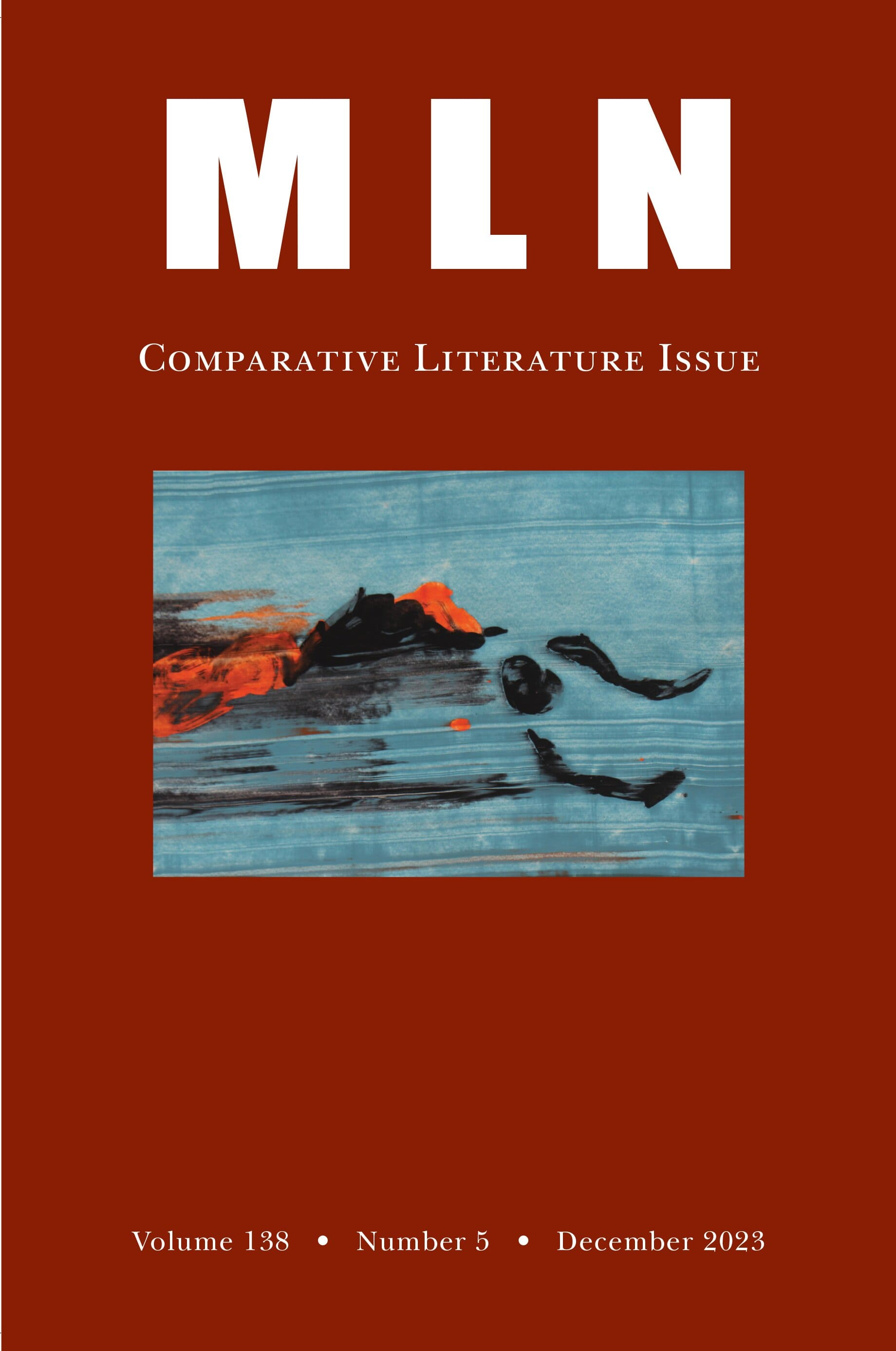BOOKS
Nidesh Lawtoo, Homo Mimeticus: Eine neue Theorie der Imitation (Lit Verlag, 2024, Open Access)
Nidesh Lawtoo, Das Phantom von Ego: Nietzsche, Modernismus, und das Mimetische Unbewusste (Lit Verlag 2024, Open Access)
Nidesh Lawtoo, (Nieuw) Fascisme: Besmetting, Gemeenschap, Mythe (Noordboek 2024)
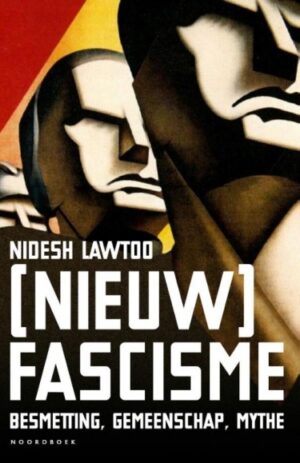
Nidesh Lawtoo, Violence and the Mimetic Unconscious: vol. 2 The Affective Hypothesis (Michigan State UP, 2023)
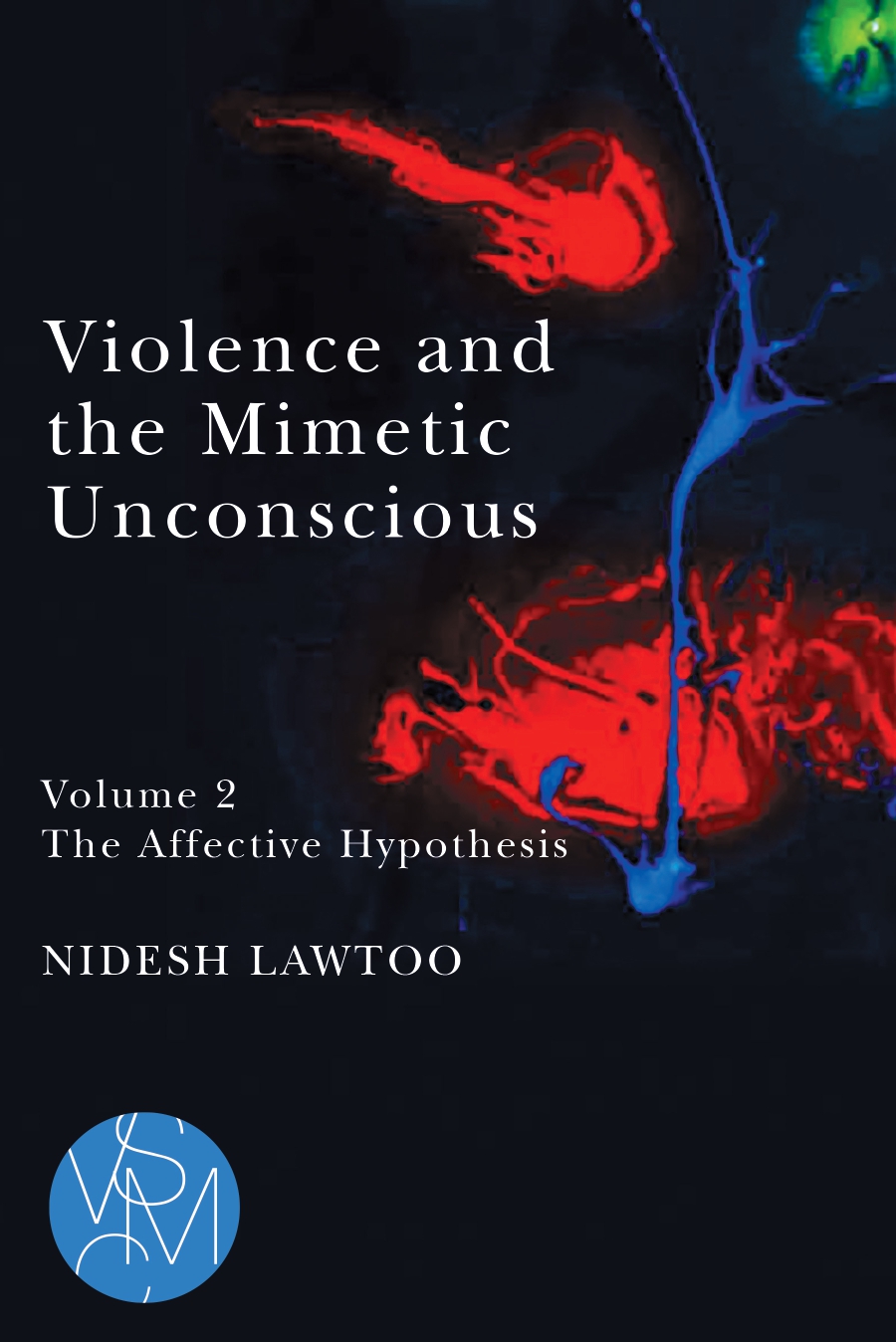 Representations of violence have subliminal contagious effects, but what kind of unconscious captures this imperceptible affective dynamic in the digital age? In volume two of a Janus-faced diagnostic of the cathartic and contagious effects of (new) media violence, Nidesh Lawtoo promotes the transdisciplinary field of mimetic studies by reevaluating the unconscious actions and reactions of homo mimeticus. As a new theory of mimesis emerges, Violence and the Mimetic Unconscious offers a searching diagnosis as to why the pathos of (new) media violence—from film to video games, police murders to the storming of the U.S Capitol—continues to cast a material shadow on the present and future.
Representations of violence have subliminal contagious effects, but what kind of unconscious captures this imperceptible affective dynamic in the digital age? In volume two of a Janus-faced diagnostic of the cathartic and contagious effects of (new) media violence, Nidesh Lawtoo promotes the transdisciplinary field of mimetic studies by reevaluating the unconscious actions and reactions of homo mimeticus. As a new theory of mimesis emerges, Violence and the Mimetic Unconscious offers a searching diagnosis as to why the pathos of (new) media violence—from film to video games, police murders to the storming of the U.S Capitol—continues to cast a material shadow on the present and future.
Eearly Reviews:
In this impressive sequel on violence and the unconscious, Nidesh Lawtoo accounts for the horrorism at play in new forms of contemporary media violence that generate contagious pathologies in the digital age. Sensitive to the pathos of vulnerable subjects in terms of age, gender, race, and education, this remarkable study reloads Plato’s ancient question on the influence of art for mimetic studies from Nietzsche to Arendt, affect theory to the neurosciences, Greek tragedy to video games to the storming of the U.S. Capitol.
—Adriana Cavarero, honorary professor of political philosophy, University of Verona, and author of Horrorism: Naming Contemporary Violence
To grasp the speed, complexity, and contagiousness of violence today, as it crosses daily experience, the new media, neofascist movements, and circles back again, Lawtoo finds it imperative to supplant the Freudian unconscious with a mimetic unconscious that is at once collective, differentiated, porous, and suggestible. The result is an innovative, courageous, and powerful study that is indispensable today.
—William E. Connolly,, Professor of Political Theory, Johns Hopkins U, author of Resounding Events: Adventures of an Academic from the Working Class
In this latest installment of his long-standing inquiry into the “will to mime” that drives humans at an unconscious level, Lawtoo moves mimetic theory into the present, in order to confront what he calls the “hypermimetic crises” associated with contemporary media. Moving from the ancients and Nietzsche to pop culture and the most up-to-date scientific work on the operation of mirror neurons in the human brain, this fascinating book suggests that maybe Plato was right, after all, and representations of violence—fictional or real—pose a threat of ‘”mimetic contamination,” of an irrationally compelled imitation of the represented acts.
—Henry Staten, professor in the humanities at University of Washington, and the author of Techne Theory: A New Language for Art
Nidesh Lawtoo, Violence and the Oedipal Unconscious: vol.1 The Catharsis Hypothesis (Michigan State UP, 2023)
Representations of violence are often said to generate cathartic effects, but what does “catharsis” mean? And what theory of the unconscious made this concept so popular that it reaches from classical antiquity to the digital age? In Violence and the Oedipal Unconscious, Nidesh Lawtoo reframes current debates on (new) media violence by tracing the philosophical, aesthetic, and historical vicissitudes of the “catharsis hypothesis” from antiquity to modernity and into the present. In the process, Lawtoo outlines a new theory of violence, mimesis, and the unconscious that does not have desire as a via regia, but rather, the untimely realization that all affects spread contagiously and thus mimetically.
Review
Whereas Adorno’s dialectical theory analyzed the relations between the culture industry and fascism in the 20th C., Nidesh Lawtoo’s mimetic theory explains the relationship between digital social media, ubiquitous violence, and the rise of (new) fascism in the twenty-first century. Lawtoo’s genealogical diagnosis of the contagious pathologies of our time is erudite and lucid, and his precise and subtle analysis is an exemplary model of how the art of interpretation can show us a way through the spiraling vortex of our historical predicament.
–Kieran Keohane, Professor in the Department of Sociology and Criminology, University College Cork, Ireland.
Nidesh Lawtoo, Homo Mimeticus: A New Theory of Imitation (Leuven UP, 2022, available for free Open Access as of November 15!)
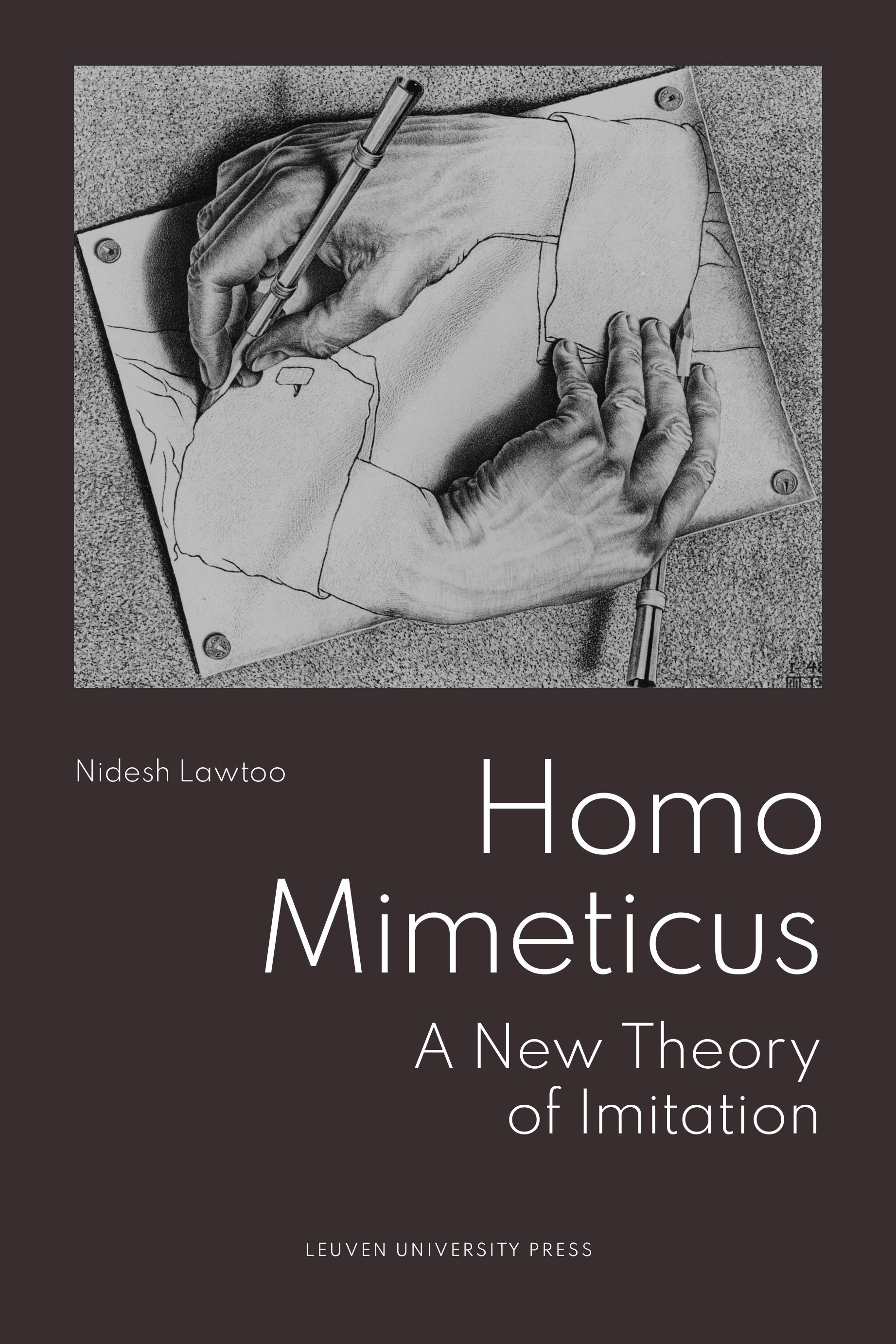 Imitation is, perhaps more than ever, constitutive of human originality. Many things have changed since the emergence of an original species called Homo sapiens, but in the digital age humans remain mimetic creatures. Crossing disciplines as diverse as philosophy, aesthetics, and politics, Homo Mimeticus proposes a new theory of one of the most influential concepts in western thought (mimesis) to confront some of the hypermimetic challenges of the present and future. In the process, it opens up the field of mimetic studies.
Imitation is, perhaps more than ever, constitutive of human originality. Many things have changed since the emergence of an original species called Homo sapiens, but in the digital age humans remain mimetic creatures. Crossing disciplines as diverse as philosophy, aesthetics, and politics, Homo Mimeticus proposes a new theory of one of the most influential concepts in western thought (mimesis) to confront some of the hypermimetic challenges of the present and future. In the process, it opens up the field of mimetic studies.
Review:
This book will make an important contribution to the discussion of mimesis in the humanities and in the social sciences. It will find readers in many countries convincing new generations of the importance of mimetic processes for human development.
Christoph Wulf, Professor of Education and Anthropology at the Free University of Berlin, and author of Mimesis: Culture-Art-Society.
Nidesh Lawtoo, (Neo)Fascismo: Contagio, Comunita, Mito (Mimesis Ed., 2020; anche disponibile in kindle)
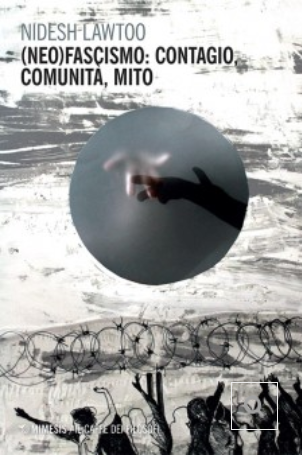 Lo spettro del fascismo si aggira di nuovo per il mondo contemporaneo. In questo libro, Nidesh Lawtoo parte dal Caso Trump per illustrare l’(in)attualità della tesi di Nietzsche secondo cui un giorno “gli attori, ogni tipo di attori, saranno i veri sovrani”. Iscrivendosi in una genealogia di teorici della mimesi – da Platone a Nietzsche, passando per Tarde, Le Bon, Freud, Bataille, Girard, Lacoue-Labarthe e Nancy – Lawtoo dimostra che il (new) fascism non è del tutto nuovo, e per niente originale. Eppure, attori che giocano il ruolo di apprendisti presidenti ricaricano il vecchio fantasma della mimesi via new media che hanno il potere sconcertante di trasformare la realtà politica in un reality show.
Lo spettro del fascismo si aggira di nuovo per il mondo contemporaneo. In questo libro, Nidesh Lawtoo parte dal Caso Trump per illustrare l’(in)attualità della tesi di Nietzsche secondo cui un giorno “gli attori, ogni tipo di attori, saranno i veri sovrani”. Iscrivendosi in una genealogia di teorici della mimesi – da Platone a Nietzsche, passando per Tarde, Le Bon, Freud, Bataille, Girard, Lacoue-Labarthe e Nancy – Lawtoo dimostra che il (new) fascism non è del tutto nuovo, e per niente originale. Eppure, attori che giocano il ruolo di apprendisti presidenti ricaricano il vecchio fantasma della mimesi via new media che hanno il potere sconcertante di trasformare la realtà politica in un reality show.
Nidesh Lawtoo, (New) Fascism: Contagion, Community, Myth (MSU P, August 1, 2019; available here).
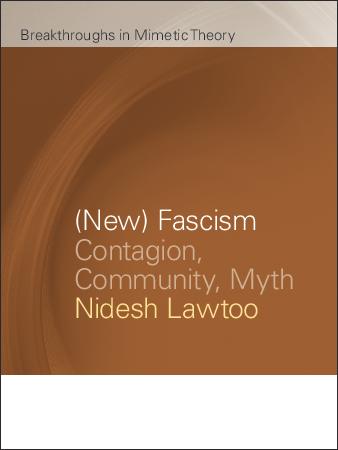 Fascism tends to be relegated to a dark chapter of European history, but what if new forms of fascism are currently returning to the forefront of the political scene? In this book, Nidesh Lawtoo considers Donald Trump as a case study to illustrate Nietzsche’s untimely claim that, one day, “ ‘actors,’ all kinds of actors, will be the real masters.” In the process, Lawtoo joins forces with a genealogy of mimetic theorists—from Plato to Nietzsche, via Tarde, Le Bon, Freud, Bataille, Girard, Lacoue-Labarthe, and Nancy—to show that (new) fascism may not be fully “new,” let alone original; yet it effectively reloads the old problematics of mimesis via new media that have the disquieting power to turn politics itself into a fiction.
Fascism tends to be relegated to a dark chapter of European history, but what if new forms of fascism are currently returning to the forefront of the political scene? In this book, Nidesh Lawtoo considers Donald Trump as a case study to illustrate Nietzsche’s untimely claim that, one day, “ ‘actors,’ all kinds of actors, will be the real masters.” In the process, Lawtoo joins forces with a genealogy of mimetic theorists—from Plato to Nietzsche, via Tarde, Le Bon, Freud, Bataille, Girard, Lacoue-Labarthe, and Nancy—to show that (new) fascism may not be fully “new,” let alone original; yet it effectively reloads the old problematics of mimesis via new media that have the disquieting power to turn politics itself into a fiction.
Review
“A penetrating investigation of neofascist leaders’ power to trigger mimetic contagion among enthusiastic crowds, both in Europe and in the United States, Nidesh Lawtoo’s insightful book reframes fundamental concepts of our political tradition in light of current mass-mediated forms of communication and hypermimetic strategies of mythologization.”
—Adriana Cavarero, Professor Emeritus, Political Philosophy, University of Verona, and author of Inclinations: A Critique of Rectitude
Nidesh Lawtoo, Il Fantasma dell’io: la massa e l’inconscio mimetico, tr. Elena Cantoni (Mimesis ed., 2018).
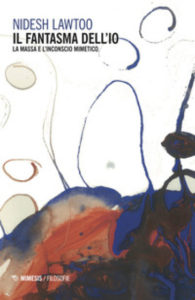 Un fantasma si aggira per il mondo moderno: “il fantasma dell’io.” Con questa frase, Friedrich Nietzsche offre una diagnosi dell’io moderno che trova nell’imitazione di massa la via regia all’inconscio. Sulle orme di Nietzsche, autori modernisti come Joseph Conrad, D. H. Lawrence, Georges Bataille – letti in dialogo con scienze umane come l’antropologia e la psicanalisi, le ricerche sull’ipnosi e la psicologia di massa – si interrogano su fenomeni mimetici riflessi che non sono sotto il controllo razionale della coscienza e che sono, in questo senso, in-consci.
Un fantasma si aggira per il mondo moderno: “il fantasma dell’io.” Con questa frase, Friedrich Nietzsche offre una diagnosi dell’io moderno che trova nell’imitazione di massa la via regia all’inconscio. Sulle orme di Nietzsche, autori modernisti come Joseph Conrad, D. H. Lawrence, Georges Bataille – letti in dialogo con scienze umane come l’antropologia e la psicanalisi, le ricerche sull’ipnosi e la psicologia di massa – si interrogano su fenomeni mimetici riflessi che non sono sotto il controllo razionale della coscienza e che sono, in questo senso, in-consci.
Review:
Oltre all’approccio storico, filosofico, e letterario – Il fantasma
dell’io contiene una lettura della realtà estremamente attuale, capace di parlare alla e della contemporaneità in maniera acuta e a tratti provocatoria, toccando nervi scoperti del nostro tempo quali il contagio, la viralità, e il trascinamento ipnotico delle masse. Alessandra Diazzi, Lecturer in Italian, University of Manchester
SPECIAL ISSUES,
Nidesh Lawtoo, ed. The Mimetic Turn, MLN 138.5 (2023)
After the linguistic and the affective turn, the new materialist turn and the performative turn, the cognitive turn and the posthuman turn, among other recent theoretical, critical and post-critical turns, it is perhaps time to re-turn to the ancient, yet also modern and still contemporary realization that humans are mimetic creatures. Chapters from Plato to Nietzsche, Wilde to Benjamin, Adorno to contemporary film by key players in mimetic studies.
Nidesh Lawtoo, ed. Posthuman Mimesis, Journal of Posthumanism 2.2 (2022)
 This special issue introduces the mimetic turn in posthuman studies. Joining forces with N. Katherine Hayles as well as other scholars of the posthuman, the issue argues that mimesis is central to the process of becoming posthuman; it also introduces new concepts–from mimetic pathos, to patho-logies, to hypermimesis–to account for present and future transformations, including COVID-19 and the Russian invasion of Ukraine of 2022 and the hypermimetic wars online that shadow it.
This special issue introduces the mimetic turn in posthuman studies. Joining forces with N. Katherine Hayles as well as other scholars of the posthuman, the issue argues that mimesis is central to the process of becoming posthuman; it also introduces new concepts–from mimetic pathos, to patho-logies, to hypermimesis–to account for present and future transformations, including COVID-19 and the Russian invasion of Ukraine of 2022 and the hypermimetic wars online that shadow it.
Nidesh Lawtoo, ed. The Mimetic Condition, CounterText 8.1 (2022)
 Based on a HOM conference held at KU Leuven, this special issue of CounterText on The Mimetic Condition (ed. Nidesh Lawtoo) joins forces with Jean-Luc Nancy, Gunter Gebauer, Christoph Wulf, and many others in order to promote a mimetic turn, or re-turn of attention to mimesis across different areas of critical theory. In the process, it proposes steps to a new theory of homo mimeticus to face some of the main–pandemic, political, environmental…– crises that cast a shadow on the present and future.
Based on a HOM conference held at KU Leuven, this special issue of CounterText on The Mimetic Condition (ed. Nidesh Lawtoo) joins forces with Jean-Luc Nancy, Gunter Gebauer, Christoph Wulf, and many others in order to promote a mimetic turn, or re-turn of attention to mimesis across different areas of critical theory. In the process, it proposes steps to a new theory of homo mimeticus to face some of the main–pandemic, political, environmental…– crises that cast a shadow on the present and future.
Christopher GoGwilt, Ellen Burt Harrington, Nidesh Lawtoo eds. Conradian Crosscurrents: Creativity and Critique Conradiana 48.2-3 (2016).
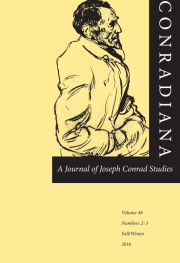 Based on a conference held at Fordham University, New York, in 2017, a few blocks from Trump Tower, this special issue assembles essays that demonstrate why Conrad’s critique of the horror remains relevant to counter contemporary political horrors. Joining critical and creative essays by prominent figures like Adriana Cavarero, James Clifford, and J. Hillis Miller, among others, the special issue promotes a mimetic turn, or re-turn of mimesis, in Conrad studies that counters emerging forms of (new) fascist will to power, both in Europe and the US.
Based on a conference held at Fordham University, New York, in 2017, a few blocks from Trump Tower, this special issue assembles essays that demonstrate why Conrad’s critique of the horror remains relevant to counter contemporary political horrors. Joining critical and creative essays by prominent figures like Adriana Cavarero, James Clifford, and J. Hillis Miller, among others, the special issue promotes a mimetic turn, or re-turn of mimesis, in Conrad studies that counters emerging forms of (new) fascist will to power, both in Europe and the US.
Nidesh Lawtoo, ed. Poetics and Politics: With Lacoue-Labarthe. MLN 132.5 (2017).
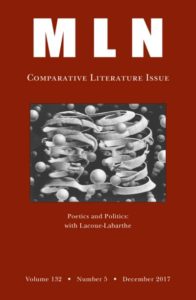 This special issue of Modern Language Notes rethinks the relation between “poetics and politics, poétique et politique” in the company of the French philosopher Philippe Lacoue-Labarthe. Including articles from major figures in continental philosophy (Jean-Luc Nancy, Alain Badiou), political theory (Jane Bennett), as well as from plural voices in French, German, and North American literary theory and criticism, contributors join perspectives that are usually split in different areas of investigation in order to reframe an ancient concept located at the juncture between poetics and politics, literature and philosophy: namely, mimēsis. In the process the issue casts new light on foundational mimetic concepts such as myth, sympathy, identification, figura, d plasticity in order to address the growing shadows cast by the contemporary fictions of the political.
This special issue of Modern Language Notes rethinks the relation between “poetics and politics, poétique et politique” in the company of the French philosopher Philippe Lacoue-Labarthe. Including articles from major figures in continental philosophy (Jean-Luc Nancy, Alain Badiou), political theory (Jane Bennett), as well as from plural voices in French, German, and North American literary theory and criticism, contributors join perspectives that are usually split in different areas of investigation in order to reframe an ancient concept located at the juncture between poetics and politics, literature and philosophy: namely, mimēsis. In the process the issue casts new light on foundational mimetic concepts such as myth, sympathy, identification, figura, d plasticity in order to address the growing shadows cast by the contemporary fictions of the political.
ARTICLES & CHAPTERS
Nidesh Lawtoo, “The Mimetic Faculty Reloaded: Contagion, Immunization, Conspiracies in the Age of Viral Reproduction,” in Epidemics and Pandemics: Philosophical Perspectives, 253-278. Brepols, 2024.
Nidesh Lawtoo, “Hypermimetic Police Violence: Racist Police Violence in the Case of Rayshard Brooks”, Somatechnics 14.1 (2024): 26-44.
Nidesh Lawtoo, “Introducing Mimetic Studies,” MLN 138.5 (2023): 1379-91-
NIdesh Lawtoo, “Wilde’s Mime Acts: Performing Minor Mimesis” MLN 138.5 (2023): 1438-59.
Nidesh Lawto, “Shared Voices: Lacoue-Nancy’s Mimetic Methexis Eds. Susanna Lindberg, Artemy Magun, Marita Tatari. Diaphanes, 2023, pp. 209-307.
Nidesh Lawtoo, “ The Patho-Logies of Exclusion: Politics, Media, (New) Fascism” In Imagining the Other: Mimetic Theory, Migration, Exclusionary Politics, and the Ambiguous Other. Eds. Dietmar Regensburger, Nikolaus Wandinger. Innsbruk UP, pp. 221-250.
Nidesh Lawtoo, “The Angel as Host: J. Hillis Miller’s Last Flight,” symplokē 30.1-2 (2022): 223-251.
Nidesh Lawtoo, “The Insurrection Moment: Intoxication, Conspiracy, Assault,” Theory & Event 26.1 (2023): 5-30.
Nidesh Lawtoo, “Caillois on Mimicry,” Effects 3. (2022): 20-35.
Kieran Keohane, “Interview with Nidesh Lawtoo,” Irish Journal of Sociology 2022: 1-5.
Niki Hadikoesoemo, “Figurations of the Mime: Between Imitation and Production in Derrida, Lacoue-Labarthe, and Irigaray,” PhD. Dissertation, 2022.
Nidesh Lawtoo, “Posthumanism and Mimesis: An Inroduction,” Journal of Posthumanism 2.2 (2022), 87-100.
Nidesh Lawtoo, “Posthuman Mimesis I: Concepts for the Mimetic Turn. “ Journal of Posthumanism 2.2 (2022): 101-114.
Katherine Hayles, Nidesh Lawtoo, “Posthuman Mimesis II: A Dialogue between Nidesh Lawtoo and Katherine Hayles,” Journal of Posthumanism 2.2 (2022): 181-191.
Jean-Luc Nancy and Nidesh Lawtoo: Jean-Luc Nancy:
«Tal vez la democracia sea una mímesis sin modelo,» Revista de Occidente 493 (2022): 99-126.
Jean-Luc Nancy and Nidesh Lawtoo “Mimesis: A Singular-Plural.Concept,” CounterText 8.1 (2022): 23-45.
Nidesh Lawtoo, “Birth of HomoMimeticus: Nietzsche, Genealogy, Communication ,” CounterText 8.1 (2022): 61-87.
Daniel Villegas Velez, “Apparatus of Capture: Music and the Mimetic Construction of Social Reality in the Early Modern/Colonial Period,” CounterText 8.1 (2022): 123-148.
Nidesh Lawtoo, “The MimeticCondition: Theory and Concepts,” CounterText 8.1 (2022): 1-22.
Nidesh Lawtoo, Viral Mimesis: The Patho(-)Logies of the Coronavirus Paragrana 30 (2021): 155-168.
William E. Connolly & Nidesh Lawtoo. “Planetary Conrad: William Connolly and Nidesh Lawtoo in Dialogue.” The Conradian (2021): 144-171.
Niki Hadikoesoemo, “In Favor of an Ontology of Sexual Difference: Luce Irigaray on Mimesis and Fluidity,” Rivista di Indagine Filosofica e di Nuove Pratiche della Conoscenza 8. 1 (2021): 106-129.
Nidesh Lawtoo, The Human Chameleon: Zelig, Nietzsche, and the Banality of Mimesis, Film-Philosphy 25.3 (2021): 272-295.
Adriana Cavarero, Nidesh Lawtoo, Mimetic Inclinations: A Dialogue with Adriana Cavarero in Contemporary Italian Women Philosophers: Stretching the Art of Thinking, eds. Silvia Benso, Elvira Roncally, SUNY, 2021.
Jean-Luc Nancy, Nidesh Lawtoo, Mimesis: Concept singulier-pluriel L’Esprit Createur 62.2 (2021): 147-67.
Nidesh Lawtoo, “Black Mirrors: Reflecting (on) Hypermimesis” Philosophy Today 65. 3 (2021): 523-547.
Hans H. Alma and Nidesh Lawtoo,The kracht van mimesis: Nidesh Lawtoo’s perspectif op het werk van William Connolly, trans. Hans Alma, in Verwevenheid: Essays over een verbindend humanism. Brussels: VUB Press, 2021, 149-68.
Nidesh Lawtoo and J. Hillis Miller, The Critic and the Mime: J. Hillis Miller in Dialogue with Nidesh Lawtoo The Minnesota Review 95 (2020): 93-119.
Nidesh Lawtoo, “The Excess of Mimesis: Reframing The Picture of Dorian Gray.” Partial Answers 18.2 (2020): 213-238.
Nidesh Lawtoo, “Virus mimetico e mimesi virale.” In Virale: Il presente al tempo dell’epidemia, eds. Roberto De Gaetano, Angela Maiello (Cosenza: Pellegrini Editore, 2020).
Niki Hadikoesoemo, “Phantoming the Subject: Diderot, Lacoue-Labarthe and the Actor’s Paradox,” Revista Brasileira de Estudos da Presença 10. 3. (2020): 1-25.
Nidesh Lawtoo, “Lawrence Contra (New) Fascism,” College Literature 47.2 (2020): 287-317.
Nidesh Lawtoo, “The Case of Eichmann Restaged: Arendt, Evil, and the Complexity of Mimesis,” Political Research Quarterly 2020: 1-20.
Daniel Villegas Velez, “Interruption–Intervention: On the Interval Between Literature and Music in Jean-Luc Nancy’s ‘Myth Interrupted’.” Performance Philosophy 5.2 (2020): 183-202.
Niki Hadikoesoemo, “Altering Bodies: Thinking of Intervention through Impersonation.” Performance Philosophy 5.2 (2020): 316-331.
Nidesh Lawtoo, “The Shadow of the Symposium: Sameness and Difference Replayed.” MLN 134.5 (2019): 898-909.
Wojciech Kaftanski, “Kierkegaard’s Existential Mimesis,” in The Kierkegaard Mind, Routledge, 2019: 191-202.
Nidesh Lawtoo. “‘This is No Simulation!”: Hypermimesis in Being John Malkovich and Her.” Quarterly Review of Film and Video (2019): 1-29.
Daniel Villegas Velez. Deleuze and the Simulacrum: Between the Phantom and the Fantasy (A Genealogical Reading). Tijdschrift voor Filosofie 81 (2019): 131-149.
Nidesh Lawtoo. The Powers of Mimesis: Simulation, Encounters, Comic Fascism. Theory & Event 22.3(2019): 722-746.
Nidesh Lawtoo, “Violence and the Mimetic Unconscious (Part II) The Contagious Hypothesis: Plato, Affect, Mirror Neurons. Contagion 26 (2019): 123-160.
Daniel Villegas Velez.”Allegory, noise, and history: the Arcades Project looks back at the Trauerspielbuch. New Writing The International Journal for the Practice and Theory of Creative Writing, 2019: 1-4.
Nidesh Lawtoo, “The Mimetic Unconscious: A Mirror for Genealogical Reflections.” Imitation, Suggestion, Contagion: Rethinking the Social, ed. Christian Borch. New York: Routledge, 2019, 37-53.
Nidesh Lawtoo, “An Exemplary Reader: J. Hillis Miller on Criticism as Performance,” Conradiana 50.3 (2018): 227-242.
Nidesh Lawtoo, “Reading Reading Conrad” by J. Hillis Miller. Conradiana 50.3 (2018): 299-311.
Nidesh Lawtoo, “The Critic as Mime: Oscar Wilde’s Theoretical Performance,” Symploke 26.1-2 (2018): 307-328.
Nidesh Lawtoo, “Violence and the Mimetic Unconscious (Part One) The Cathartic Hypothesis: Aristotle, Freud, Girard.” Contagion 25 (2018): 159-191.
Nidesh Lawtoo, “The Plasticity of Mimesis.” MLN 132.5 (2017): 1201-1224.
Nidesh Lawtoo, “Poetics and Politics: with Lacoue Labarthe.” MLN 132.5 (2017): 1133-1139.
Nidesh Lawtoo, “The Power of Myth (Reloaded): From Nazism to New Fascism.” L’Esprit Createur, 57.4 (2017): 64-82.
William Connolly and Nidesh Lawtoo, “Rhetoric, Fascism, and the Planetary: A Conversation between William Connolly and Nidesh Lawtoo,” The Contemporary Condition. July. 2017
Nidesh Lawtoo, “The Classical World: Sacrifice, Philosophy and Religion,” in The Palgrave Handbook of Mimetic Theory and Religion, ed. James Alison and Wolfgang Palaver. New York: Plagrave, 2017, 119-126.
REVIEWS, INTERVIEWS & LECTURES
N. Lawtoo, “Homo Mimeticus: Sameness and Difference Replayed.” The Leuven Philosophy Newsletter 27 (2019-2020): 9-21.
N. Lawtoo, The Philosophy of Imitation in Focus, EU Research 2019.
N. Lawtoo, “The Swarming of Mimesis. A Review of William Connolly, Facing the Planetary: Entangled Humanism and the Politics of Swarming,” Postmodern Culture 28.1 (2017).
Niki Hadikoesoemo and N. Lawtoo, Interview with Nidesh Lawtoo, The Leuven Philosophy Newsletter vol. 25 (2017-2018): 8-12.
 This project has received funding from the European Research Council (ERC) under the European Union’s Horizon 2020 research and innovation programme (grant agreement n°716181)
This project has received funding from the European Research Council (ERC) under the European Union’s Horizon 2020 research and innovation programme (grant agreement n°716181)



